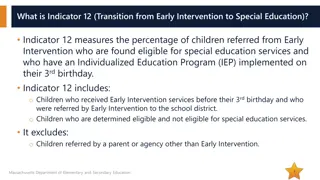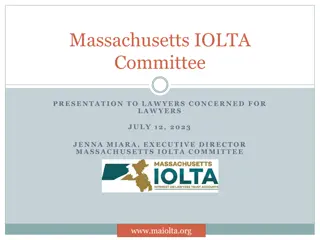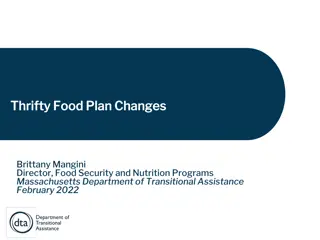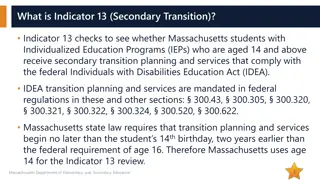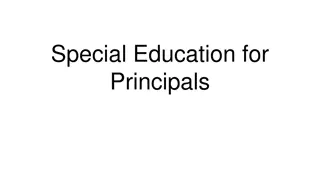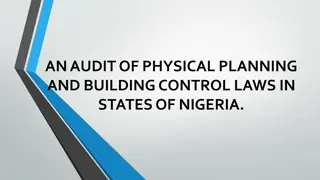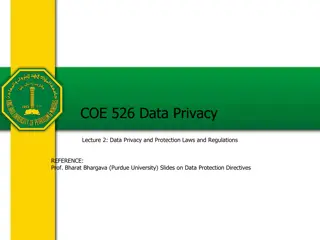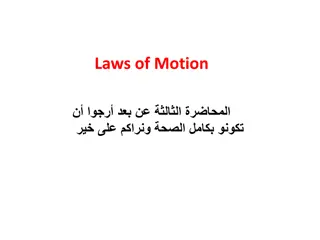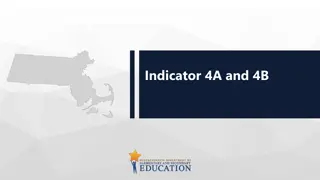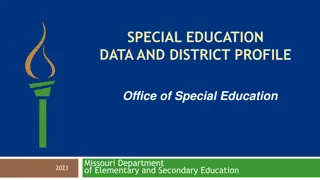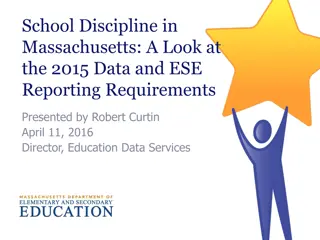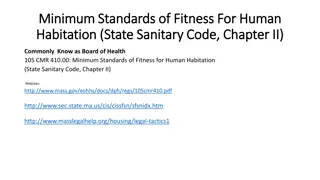Special Education Laws and Regulations in Massachusetts
Explore the laws and regulations governing special education in Massachusetts, including the Individuals with Disabilities Education Improvement Act (IDEA) at the federal level and Chapter 71B and 603 CMR 28.00 at the state level. Learn about key principles such as parent and student participation, free and appropriate public education (FAPE), appropriate evaluation, individualized education program (IEP), least restrictive environment (LRE), and procedural safeguards. Understand the importance of parental and student involvement, the provision of no-cost appropriate services, and the significance of individualized evaluations in determining special education eligibility.
Download Presentation

Please find below an Image/Link to download the presentation.
The content on the website is provided AS IS for your information and personal use only. It may not be sold, licensed, or shared on other websites without obtaining consent from the author.If you encounter any issues during the download, it is possible that the publisher has removed the file from their server.
You are allowed to download the files provided on this website for personal or commercial use, subject to the condition that they are used lawfully. All files are the property of their respective owners.
The content on the website is provided AS IS for your information and personal use only. It may not be sold, licensed, or shared on other websites without obtaining consent from the author.
E N D
Presentation Transcript
Special Education Laws The Individuals with Disabilities Education Improvement Act -- IDEA -- Federal Special Education Law Chapter 71B -- Massachusetts Special Education Law 603 CMR 28.00 Massachusetts Special Education Regulations 2 Massachusetts Department of Elementary and Secondary Education
Related Laws The Massachusetts Education Reform Act Section 504 of the Rehabilitation Act Chapter 688 of the Acts of 1983 The Americans with Disabilities Act - ADA 3 Massachusetts Department of Elementary and Secondary Education
Six Basic Principles: Parent and Student Participation Free and Appropriate Public Education (FAPE) Appropriate Evaluation Individualized Education Program (IEP) Least Restrictive Environment (LRE) Procedural Safeguards 4 Massachusetts Department of Elementary and Secondary Education
Parent and Student Participation Parents have the right and are encouraged to be involved as full partners. Students are the focus of special education and are expected to participate in planning for their own future as much as possible. The school district is obligated to make strong efforts to ensure parental and student participation. 5 Massachusetts Department of Elementary and Secondary Education
Free and Appropriate Public Education Free = At no cost to the parent. Appropriate = Services sufficient to enable the student to appropriately progress in education and advance toward achieving the IEP goals. Public = Provided by the public school district or under the direction of the public school district. Education = Preschool, elementary and secondary education, including extra-curricular and non-academic school activities. 6 Massachusetts Department of Elementary and Secondary Education
Appropriate Evaluation An individualized appropriate evaluation is required in all areas related to the suspected disability(ies) The Team uses the evaluation information to determine if the student has an educational disability Every three years, the student must be individually reevaluated to determine if he or she remains eligible for special education. No single assessment should be used as the sole basis for finding a student eligible or ineligible for special education 7 Massachusetts Department of Elementary and Secondary Education
Individualized Education Program: the IEP The IEP contains: Written information on the parent s concerns and the student s skills. A written explanation of how the disability affects the student s ability to learn and to demonstrate his or her learning. An identification of specific, measurable goals which can be reached in a year s time. A listing of the services to be provided to the student. 8 Massachusetts Department of Elementary and Secondary Education
Individualized Education Program: the IEP The IEP s purpose is to outline: What will be done to assist the student to make effective progress in the general curriculum and in the life of the school. How the student will participate in state and local assessment. State assessment in Massachusetts means the MCAS. The goals the student is expected to reach by the end of the IEP period. 9 Massachusetts Department of Elementary and Secondary Education
Least Restrictive Environment To the maximum extent appropriate, students with disabilities have the right to be educated in the general education environment in the classroom they would have attended if they did not have disabilities. The student cannot be removed from the general education classroom solely because of needed curriculum modifications. Removal from the general education program occurs only if the nature or severity of the disability is such that education in general education classes with the use of supplementary aids and services cannot be satisfactorily achieved. 10 Massachusetts Department of Elementary and Secondary Education
Procedural Safeguards Procedural Safeguards include the: Right to written notice Right to consent/refuse Right to stay put Problem Resolution System Mediation and Due Process Timelines Confidential records Right to receive evaluations 2 days in advance of Team meeting, if requested 11 Massachusetts Department of Elementary and Secondary Education
The Six Principles 1. Parent and Student Participation 2. Free and Appropriate Public Education (FAPE) 3. Appropriate Evaluation 4. Individualized Education Program (IEP) 5. Least Restrictive Environment (LRE) 6. Procedural Safeguards 12 Massachusetts Department of Elementary and Secondary Education



